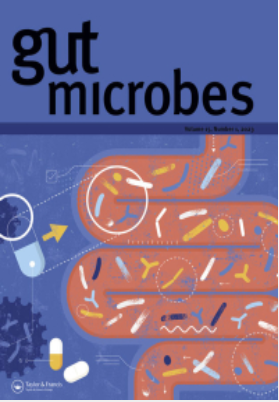枯萎梭杆菌及其代谢产物5-氨基戊酸通过DKK2通过Wnt/β-catenin通路促进肥胖个体结直肠癌的发生。
IF 12.2
1区 医学
Q1 GASTROENTEROLOGY & HEPATOLOGY
引用次数: 0
摘要
结直肠癌(CRC)是世界上最常见的癌症之一,具有高发病率和死亡率。越来越多的研究表明,肥胖是结直肠癌发生的重要危险因素。此外,最近的研究结果强调了肠道微生物群与肥胖和结直肠癌之间的密切联系。尽管如此,肠道微生物群影响肥胖和结直肠癌的具体机制仍不清楚。本研究旨在探讨肠道细菌腐烂梭杆菌及其代谢物5-氨基戊酸(5-AVA)在肥胖和结直肠癌发生中的作用。我们的研究发现,腐烂梭杆菌产生的代谢物5-氨基戊酸显著抑制肿瘤抑制因子DKK2的表达。这种抑制导致CRC细胞增殖增强。此外,我们发现梭杆菌和5-AVA可以通过抑制DKK2激活Wnt/β-catenin信号通路,从而促进肿瘤生长。这一发现在CRC小鼠模型和体外实验中得到了验证。其他机制研究表明,5-AVA与去甲基化酶KDM6B相互作用,影响DKK2的去甲基化过程,随后激活Wnt/β-catenin信号通路。我们的研究回顾性地收集了过去五年在中山大学附属第六医院接受胃肠内镜检查的患者的粪便样本。参与者根据结肠镜检查结果被分为健康对照组和腺瘤组。在此之后,我们进行了宏基因组分析以识别差异细菌,并根据结果进行了细菌培养和代谢组学分析。利用Western Blot、qPCR、免疫组织化学、分子对接模拟和基因过表达研究等技术,通过动物模型和细胞分析进一步验证了目标细菌及其代谢物的作用。本研究揭示了梭杆菌和5-AVA在肥胖和结直肠癌发展中的潜在致癌作用。我们的研究强调了肠道菌群与宿主代谢之间复杂的相互作用,并为探索肠道菌群调节如何预防和治疗结直肠癌提出了新的研究方向。本文章由计算机程序翻译,如有差异,请以英文原文为准。
Fusobacterium mortiferum and its metabolite 5-aminovaleric acid promote the development of colorectal cancer in obese individuals through Wnt/β-catenin pathway by DKK2.
Colorectal cancer (CRC) is one of the most prevalent cancers worldwide, with high incidence and mortality rates. An increasing body of research suggests that obesity is a significant risk factor for the development of CRC. Moreover, recent findings have highlighted the close association between the gut microbiota and both obesity and CRC. Despite this, the specific mechanisms by which the gut microbiota influences obesity and CRC remain unclear. This study aims to explore the role of the gut bacterium Fusobacterium mortiferum and its metabolite 5-aminovaleric acid (5-AVA) in the development of obesity and CRC. Our study found that the metabolite 5-aminovaleric acid produced by Fusobacterium mortiferum significantly inhibits the expression of the tumor suppressor DKK2. This inhibition leads to enhanced proliferation of CRC cells. Furthermore, we discovered that Fusobacterium mortiferum and 5-AVA can activate the Wnt/β-catenin signaling pathway by inhibiting DKK2, thereby promoting tumor growth. This finding was validated in CRC mouse models and in vitro experiments. Additional mechanistic studies revealed that 5-AVA interacts with the demethylase KDM6B, affecting the demethylation process of DKK2 and subsequently activating the Wnt/β-catenin signaling pathway. Our study retrospectively collected fecal samples from patients who underwent gastrointestinal endoscopy at the Sixth Affiliated Hospital of Sun Yat-sen University over the past five years. Participants were stratified into a healthy control group and an adenoma group based on the outcomes of their colonoscopies. Following this, we conducted metagenomic analysis to identify differential bacteria, and based on the results, we performed bacterial cultivation and metabolomic profiling. The roles of the targeted bacteria and their metabolites were further validated through animal models and cellular assays, employing techniques such as Western Blot, qPCR, immunohistochemistry, molecular docking simulations, and gene overexpression studies. This study uncovers the potential carcinogenic effects of Fusobacterium mortiferum and 5-AVA in the development of obesity and CRC. Our research emphasizes the complex interplay between the gut microbiota and host metabolism and suggests new directions for future research to explore how modulation of the gut microbiota could prevent and treat CRC.
求助全文
通过发布文献求助,成功后即可免费获取论文全文。
去求助
来源期刊

Gut Microbes
Medicine-Microbiology (medical)
CiteScore
18.20
自引率
3.30%
发文量
196
审稿时长
10 weeks
期刊介绍:
The intestinal microbiota plays a crucial role in human physiology, influencing various aspects of health and disease such as nutrition, obesity, brain function, allergic responses, immunity, inflammatory bowel disease, irritable bowel syndrome, cancer development, cardiac disease, liver disease, and more.
Gut Microbes serves as a platform for showcasing and discussing state-of-the-art research related to the microorganisms present in the intestine. The journal emphasizes mechanistic and cause-and-effect studies. Additionally, it has a counterpart, Gut Microbes Reports, which places a greater focus on emerging topics and comparative and incremental studies.
 求助内容:
求助内容: 应助结果提醒方式:
应助结果提醒方式:


